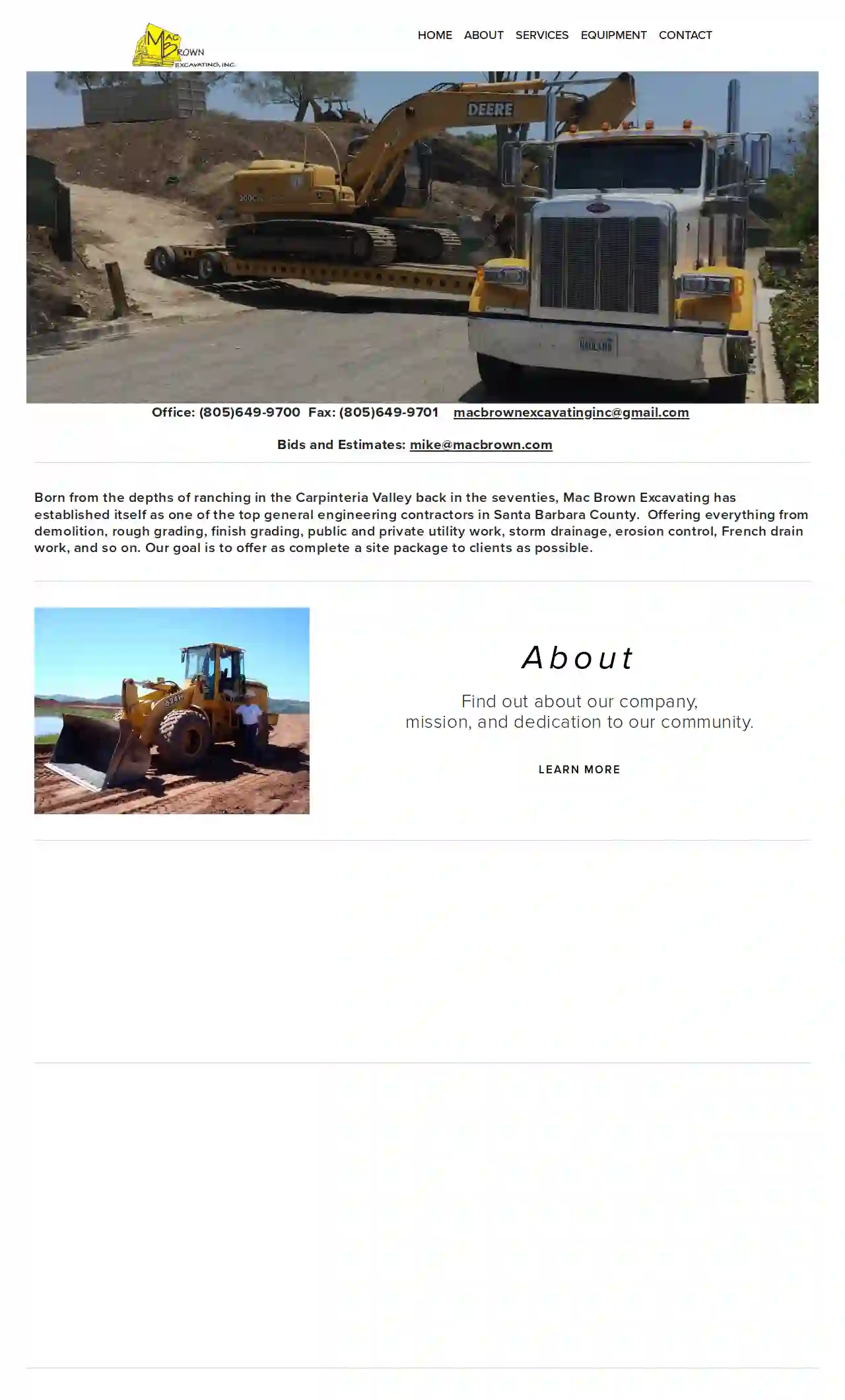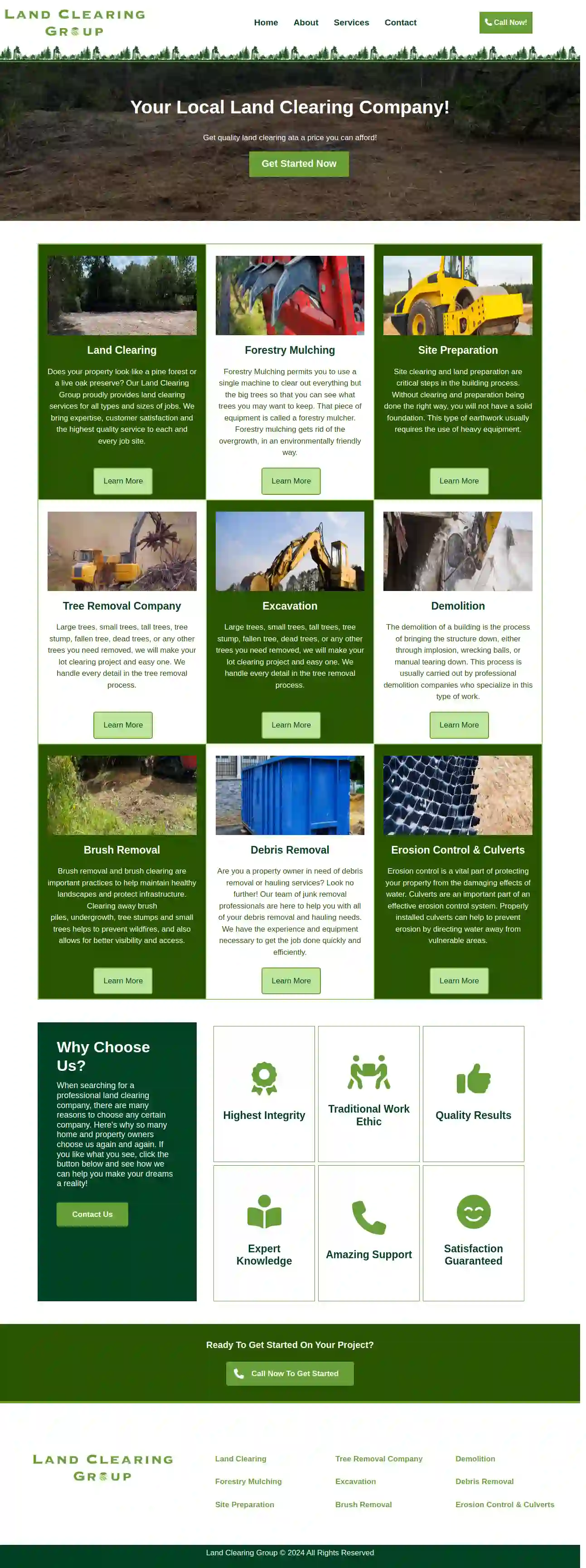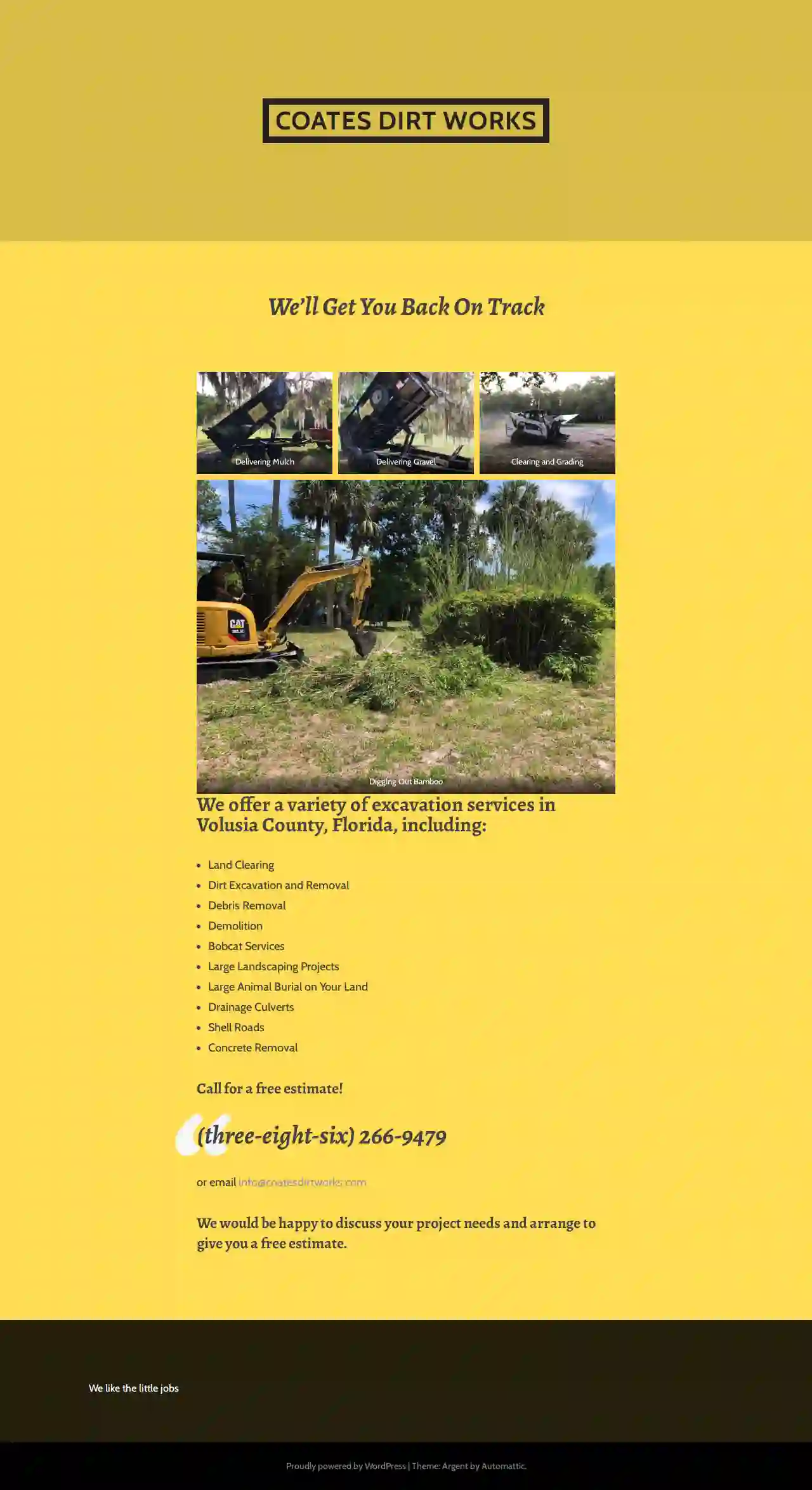Excavation Contractors Wildomar
Find the best Excavation Services in Wildomar
Get multiple Excavating Contractor quotes for your project today! Compare profiles, reviews, accreditations, portfolio, etc... and choose the best deal.

Niehaus Earthmoving LLC
51 reviewsOakland, USOur Company At Niehaus Earthmoving LLC, our mission is to provide top-quality earthwork services that exceed our clients' expectations. We strive to deliver projects on time, within budget, and to the highest standards of safety and quality. Our Experience With over 15 years of experience in the mass-excavation and grading industry, our team has the skills and expertise to handle any job, no matter how complex. We've worked on projects start to finish ranging from city streets to large-scale commercial developments, Ag production facilities, wind/solar farms, landfills, wetland restorations, river diversions, waste management lagoons, heavy highway and interstate construction. Our Services We offer a comprehensive range of earthwork and demolition services including site preparation, excavation, grading, and compaction. We also provide dust control, erosion control, and slope stabilization measures to ensure the longevity of your project. " We Move The Earth " Initiation - Planning - Execution We are able to provide efficient and cost-effective grading services to ensure your project is completed on time, on budget and to your satisfaction. We provide expertise in, in-house site design such as building sites, drainage, and roads. We can meet any vigorous project scheduling demands. Contact us today to discuss your project needs and receive an estimate.
- Services
- Why Us?
- Our Team
- Gallery
Get Quote
Edri Construction
4.851 reviews701 Cortland Ave, San Francisco, 94110, USYour Trusted Construction Partner: Excellence from Demolition to Finishes People are looking for a reputable and reliable contractor. It does indeed represent us, but what sets us apart is the ability to be attentive to the customer and guide him patiently, from the demolition stages to the impeccable finishes, with professionalism as the common thread between each and every stage. We handle even the most complex projects entirely in-house, utilizing our own team of experts and advanced equipment. This practice allows us to accurately budget every project, ensuring transparency and efficiency throughout the process. Thanks to our satisfied customers, our growth is largely fueled by referrals. We strive to maintain this momentum by consistently exceeding expectations and delivering exceptional results. At Edri Construction, we bring expertise, reliability, and a commitment to excellence to every project we undertake.
- Services
- Why Us?
- Gallery
Get Quote
Mac Brown Excavating Inc
56 reviewsP.O. Box 8, Carpinteria, 93014, USMac Brown Excavating, Inc. Born from the depths of ranching in the Carpinteria Valley back in the seventies, Mac Brown Excavating has established itself as one of the top general engineering contractors in Santa Barbara County. Offering everything from demolition, rough grading, finish grading, public and private utility work, storm drainage, erosion control, French drain work, and so on. Our goal is to offer as complete a site package to clients as possible.
- Services
- Why Us?
- Gallery
Get Quote
Demolition 4 You
52 reviewsWhittier, 90601, USProfessional Demolition Company in Whittier, CA Looking for an experienced and competent demolition contractor? You have come to the right place. We are Demolition 4 You, a professional company dedicated to offering well-formulated and high-quality services at fair and accessible prices. We operate in and around Whittier, CA and if you are interested in our assistance, keep reading to learn more. Hello, my name is Gilberto De Niz, I am a collaborator in demolition4you. We are a small Southern California demolition company, located in the city of Whittier. We are made up of a multidisciplinary and responsible team, which has extensive experience in the field of demolition and general construction. We offer our services throughout the local area and surrounding areas (L.A, Orange, Ventura & San Bernadino Counties). At demolition4you we are committed to our client’s projects, as the continuous improvement process requires us to provide a quality service at an affordable cost. About Our Excellent Services We have the expertise and technical capacity to correctly and promptly carry out even the most labor-intensive and time-sensitive projects. We will secure the site to protect passers-by and nearby structures from harm and damage. We will diligently bring down the building and save you from the hassle and stress of the task.
- Services
- Why Us?
- Our Team
- Testimonials
- Gallery
Get Quote
Joseph Construction
4.816 reviewsLong Beach, USJoseph Construction: Your Newport Beach Luxury Home Builder Building your dream home shouldn't be a hassle, but it can become one with the wrong contractor on the job. If you need a local construction company that makes new home construction and home remodeling easy, stress-free and exciting for you, count on Joseph Construction in Newport Beach, CA. We specialize in helping our clients turn their visions and dreams into the home of their dreams. Joseph Construction is a full-service contractor, from design and engineering, specializing in building beautiful luxury homes in Newport Beach and surrounding areas. We provide a variety of services for residential and commercial construction. You can depend on us for... New home construction servicesComplete remodeling servicesLand grading servicesExcavation servicesDemolition servicesConcrete services We can do everything from building high-end homes to installing long-lasting concrete driveways to demolishing dilapidated structures. Contact us today if you're interested in scheduling a consultation with our project manager. We'll be happy to give you a free estimate. When the Newport Beach, CA community needs a dependable local construction company, they turn to Joseph Construction. Along with providing comprehensive remodeling and new home construction services, we... Have been serving the area for 30+ yearsUse top-of-the-line materials for all projectsProvide free estimates for all servicesHave a wealth of industry knowledgeAre licensed, bonded and insured We look forward to hearing about your construction or remodeling plans. Call 562-340-5975 now to speak with our team. Not sure if you should hire us to build your new custom home? With Joseph Construction in charge of your new home construction job:You'll have control over every detail of your home buildYou'll get a home that meets all your wants and needsYou won't have to settle for a cookie-cutter home designYou'll own a home that stands out from the crowdLearn more about our new home construction services in Newport Beach, CA by speaking with a member of our team today. We're standing by to get started.
- Services
- Why Us?
- Gallery
Get Quote
4 Creeks, Inc.
53 reviewsFresno, USHonest. Authentic. Solutions. Welcome to 4Creeks, where design and construction converge to bring your vision to life. We are your partners in innovative design, seamless project delivery, and sustainable solutions. Finding the Right Design & Build Partner is Challenging The combined expertise of our Design and Build divisions brings together a comprehensive suite of services designed to address the multifaceted needs and challenges of your project. Through an integrated approach to design and construction, we provide technical proficiency through a collaborative process that brings your vision to life. Our work spans from initial planning and architectural design to construction management and general contracting. By merging deep technical know-how with creative vision, we are able to deliver results that overcome the obstacles that frequently plague design and construction projects. Whether it’s architecture, engineering, construction, or project management, our cohesive teams ensure that every aspect of your project is handled with the highest level of care, allowing us to create environments where both businesses and communities can thrive. Need a Partner? We Can Help. We're ready to get to work with you. We provide a breadth of design and build services throughout California, Colorado and beyond.
- Services
- Why Us?
- Gallery
Get Quote
Land Clearing Group
55 reviewsOrange, USAbout The Land Clearing Group We help homeowners and businesses clear and prepare their property for the next phase of their project. Whether you need simple brush clearing or a total clear and site prep, we are here to help. Land Clearing Group is more than just a single company, we are composed of a large team of industry professionals that can handle any land clearing project; no matter the task. Our team of pros gives property owners a combined 50+ years of experience. We have worked in land projects across the state of Florida, Land Clearing Central Florida is quickly become the industry leader in customer satisfaction.Understand that this is our top priority on all land clearing solutions. Operating with such high corporate standards is not an easy task to achieve and can be solely attributed to the multiple professionals involved. Since the start of the company, we have operated on 3 principles which are visible on every project we do: We love this stuff! We will show up at each job: on time, ready to work and have fun. There will be crystal clear communication with the property owners at all times: before, during and after all projects. Your property will always be treated the same way we would treat our own property.
- Services
- Why Us?
- Gallery
Get Quote
Coates Dirt Works LLC
513 reviewsOrange, USWe'll Get You Back On Track Coates Dirt Works offers a variety of excavation services in Volusia County, Florida, including: Land Clearing Dirt Excavation and Removal Debris Removal Demolition Bobcat Services Large Landscaping Projects Large Animal Burial on Your Land Drainage Culverts Shell Roads Concrete Removal Call for a free estimate! (three-eight-six) 266-9479 or email [email protected] We would be happy to discuss your project needs and arrange to give you a free estimate.
- Services
- Why Us?
- Gallery
Get Quote
Genali Construction Concrete Demo-Removal and Excavation Services
51 reviewsWalnut, Walnut, California, United States, USDump Rush LLC is a leader in eco-friendly concrete removal, demolition, and excavation services. As a veteran-owned business, we have established ourselves with a dual focus on clearing clutter and protecting the environment. Our mission is to provide swift and reliable services to our customers, with a commitment to precision and quality. With a range of services including concrete demolition and removal, demolition, tree stump removal, and excavation, we cater to residential and commercial clients across LA, San Gabriel, Riverside, Orange, and San Bernardino. Our team is dedicated to providing exceptional customer service, and we pride ourselves on being a customer-centric business. Contact us today to learn more about our services and how we can help you with your concrete removal, demolition, and excavation needs.
- Services
- Why Us?
- Our Team
- Gallery
Get Quote
CPRR Bobcat Services INC
58 reviews6633 NW 42nd Ave, Coconut Creek, 33073, USDig Deep, Build Strong Your trusted excavating contractor for all your residential and commercial needs Learn More (754) 457-8773 Affordable Excavation Services by CPRR BOBCAT SERVICES Grading Ensuring a site is level or contoured according to the project’s specifications, which is essential for proper drainage and foundation stability. Pool Excavations Utilizing state-of-the-art excavation equipment, we carefully dig to the exact dimensions and depth of your pool, ensuring accuracy and adherence to design specifications. Demolition We offer demolition services to get your project started. Safely tearing down existing structures and removing debris from the site. From concrete to asphalt demolition. Let us set the foundation for your project. Site Development We offer site development service converting undeveloped land into developed land for new construction. Involves removing and disposing of all unwanted vegetative matter from underground such as stumps, roots, and other debris. Trenching Digging Trenches for utilities such as water, sewer, gas and electrical lines. Backfilling Refilling excavated areas with soil or other materials to support foundations, pipes, and other structures. About CPRR BOBCAT SERVICES Our Expertise At CPRR BOBCAT SERVICES, we specialize in all types of excavation projects, including residential, commercial, and industrial. Our team has the knowledge and skills to handle any challenge and deliver superior results. Our Equipment We use only the best equipment in the industry to ensure efficient and effective excavation. Our fleet includes state-of-the-art machinery that is regularly inspected and maintained to ensure optimal performance.
- Services
- Why Us?
- Gallery
Get Quote
Over 22,076+ Excavation Businesses on our platform
Our excavation contractors operate in Wildomar & beyond!
ExcavationHQ has curated and vetted the Best Excavation Companies in Wildomar. Find a top & reliable pro today.
Frequently Asked Questions About Excavation Contractors
- Determine the Area: Measure the length and width of the area you want to fill. Multiply them to get the area in square feet (or meters).
- Determine the Depth: Measure the difference between the existing grade and the desired grade (how much you need to raise the ground). This is the depth of fill required.
- Calculate Volume: Multiply the area (step 1) by the depth (step 2) to get the volume in cubic feet (or meters).
- Account for Compaction: Fill dirt compacts when it settles, so add 10% to 25% to the calculated volume to account for compaction. The exact percentage depends on the type of fill material.
- Project Size and Scope: Larger, more complex excavations naturally take longer.
- Soil Conditions: Rocky or challenging soil types can slow down progress.
- Site Accessibility: Limited access might require more time for maneuvering equipment and hauling materials.
- Weather: Inclement weather can cause delays.
- Permitting and Inspections: Waiting for permits or inspections can extend the timeline.
- Spring and Fall: Often considered favorable due to moderate temperatures and drier soil conditions.
- Summer: Can be suitable, but hot weather can make working conditions challenging and might require additional measures (shade, hydration) for workers.
- Winter: Excavation in winter can be more difficult due to frozen ground, snow, and potential delays caused by inclement weather. It might also require specialized equipment or techniques.
How do I calculate how much dirt I need for fill?
How long does an excavation project take?
What is the best time of year for excavation?
What is the difference between cut and fill excavation?
Cut: Involves excavating soil from an area where the existing grade is higher than the desired grade.
Fill: Refers to using the excavated soil ('cut' material) to raise the grade in an area where the existing grade is lower than desired.
This method minimizes the need to import or export soil, reducing costs and environmental impact. It's commonly used for site preparation, road construction, and landscaping.
How do I calculate how much dirt I need for fill?
- Determine the Area: Measure the length and width of the area you want to fill. Multiply them to get the area in square feet (or meters).
- Determine the Depth: Measure the difference between the existing grade and the desired grade (how much you need to raise the ground). This is the depth of fill required.
- Calculate Volume: Multiply the area (step 1) by the depth (step 2) to get the volume in cubic feet (or meters).
- Account for Compaction: Fill dirt compacts when it settles, so add 10% to 25% to the calculated volume to account for compaction. The exact percentage depends on the type of fill material.
How long does an excavation project take?
- Project Size and Scope: Larger, more complex excavations naturally take longer.
- Soil Conditions: Rocky or challenging soil types can slow down progress.
- Site Accessibility: Limited access might require more time for maneuvering equipment and hauling materials.
- Weather: Inclement weather can cause delays.
- Permitting and Inspections: Waiting for permits or inspections can extend the timeline.
What is the best time of year for excavation?
- Spring and Fall: Often considered favorable due to moderate temperatures and drier soil conditions.
- Summer: Can be suitable, but hot weather can make working conditions challenging and might require additional measures (shade, hydration) for workers.
- Winter: Excavation in winter can be more difficult due to frozen ground, snow, and potential delays caused by inclement weather. It might also require specialized equipment or techniques.
What is the difference between cut and fill excavation?
Cut: Involves excavating soil from an area where the existing grade is higher than the desired grade.
Fill: Refers to using the excavated soil ('cut' material) to raise the grade in an area where the existing grade is lower than desired.
This method minimizes the need to import or export soil, reducing costs and environmental impact. It's commonly used for site preparation, road construction, and landscaping.